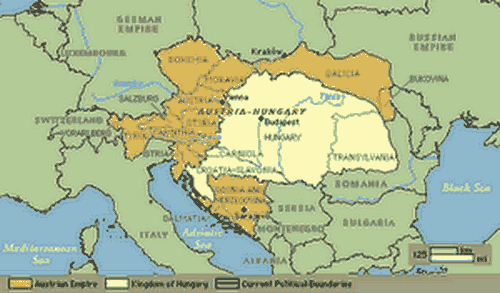World War 1 Allies
1914-1918
World War 1
Allies
Some wars make strange bedfellows. Countries that had been traditional enemies; Russia and Japan, Germany and the Ottoman Empire, and even France and Great Britain were scrapping old enmities. Although long before victory against the Central Powers was assured, Britain and France were diplomatically at odds over the division of the spoils. For some countries joining forces in past wars, it was similar ideology, for others, common interests or culture, or simply "that an enemy of my enemy is my friend". World War 1 broke the mold. In this war, partners simply chose "all of the above". Commenting on the vagaries of alliances the famous, T.E, Lawrence, who was intricate in the history of the Middle East said, "All is fair in love, war, and alliances".
Triple Entente (Allies)
vs.
Triple Alliance (Central Powers)
Great Britain, a limited monarchy, France, a republic and Russia, an absolute monarchy all were intent on defending the deep differences in their goals, but nevertheless bound them into a Triple Entente. They formed a mutual military alliance to counter the imperialistic ambitions of Germany and its Austria-Hungary ally and their Triple Alliance that included Italy. The sophisticated diplomats wrongly believed they had achieved a balance of power that would prevent conflict.
There were different roads that led each participant into the relationship that was called the Triple Entente. Many of those byways crossed each other in the form of treaties and secret agreements that formed a tangled web, without an agreed starting point, that surprisingly found a common end point as World War 1 allies. However, France seems to have always been central. After all, French was the language of diplomacy, and its purposes always haunted by the the political machinations of the Renaissance Italian, Machiavelli.
World War 1 Allies World War 1 Allies
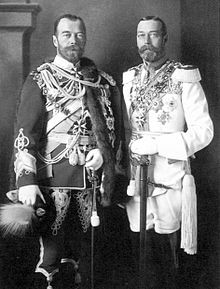 |
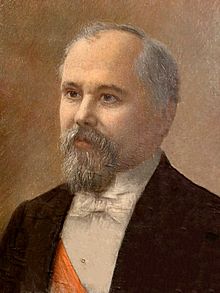 |
Russian Monarch,Tsar Nicholas & British Monarch,George V French President, Raymond Poncaire
Look alike? They were cousins.
As in the case of Germany, each of its future enemies, the entente
nations, also had reason to support their own ambitions for expanding
their empires. A somewhat paranoid Kaiser Wilhelm (Kaiser from the Latin Caesar) felt surrounded by three nations, Russia, France and Great Britain. His natural disposition to reject diplomacy as a solution would lead him into a world war which he seemed to welcome. However, before that war, Germany was exhibiting its desire to expand at the expense of France.
Through a series of secret as well as published agreements in late 19th and early 20th centuries, many European nations arranged to avoid stepping on each others toes by establishing and respecting spheres of influence in Africa and Asia. Germany was noticeably an absent partner preferring to act with a smaller group of like minded nations. Germany openly displayed disdain for the rights of its European neighbors.
This was evident in their hostile attack on France in July 1870, when the German states, marshaled by the Prussian monarchy, struck France. France was forced to cede a rich prize, Alsace- Lorraine and Chancellor Bismark would pull the various Germanic states into a unified nation that was more of a threat to its continental neighbors.
As planned by German Chancellor, Otto Von Bismark (Iron Chancellor), France was left defeated and diplomatically isolated. It had no mutual defense treaties excepting those non military arrangements dealing with dispositions of influence on other continents. However, Germany was taking no chances that a potential Russian -French alliance would force Germany into a two front war. In 1881 Germany and Russia secretly agreed to respect the then current territories of each. The quid pro quo was Germany recognizing Russian sphere of influence in Bulgaria. Six years later, 1887, the agreement was formalized as the Reinsurance Treaty scheduled to run three years. This left the French desperate for an ally. A "treaty" with Russia would be a diplomatic coup. However, the French Constitution required that a treaty be approved by its Chamber of Deputies. The possibility existed that a treaty with Russia would be defeated by that body. Thus, The French Foreign Minister called the agreement a "convention" and avoided a confrontation with the Deputies. Russia approved, and in an about face, did not renew the Reinsurance Treaty with Germany.
These were the safe years that Germany used to build a war machine and duplicitously engage other European countries in diplomatic gamesmanship. They had betrayed Bulgaria to empower Russia. Nevertheless, Bulgaria would ultimately choose joining the Central Powers as a wartime partner because Russia was more of a menace to a free Bulgaria than another German ally, the Ottomans, with their loose footprint in the Balkans. Wilhelm had courted the Ottomans and his bellicosity toward Russia must have charmed the Turks. The seat of the Ottoman Empire sat astride Europe and Asia and a natural block to Russian ambitions for a southern passage into the Mediterranean Sea. During this era, Ottoman and Turkey were names used interchangeably as did its major city known to the world as Constantinople or Istanbul.
Wilhelm's Chancellor, Bismark, had trounced the French in 1870, but wisely acted as a brake on further German ambitions as Wilhelm ascended to the throne in 1888. However, the Kaiser forced Bismark from government leaving Wilhelm unchecked to deal on the international stage.
Threats against European neighbors were common place through the reign of German Kaiser Wilhelm II (1888-1918). He found mutual interests with Emperor Franz Joseph (Austria- Hungary-1848-1916). Their peoples shared a common culture and language. Both of these men had displayed little compunction about extending their realms at the expense of adjacent countries. In point of fact, even their countries had been at war with each other in mid 19th century when the Austrians unsuccessfully attempted to impose Hapsburg succession over Prussia and the German confederation of states. Each of these monarchs, and their predecessors, were no strangers to wars of conquest. In 1879, they formed an alliance to defend against potential Russian aggression that was a challenge to Austrian ambitions in the Balkans.Together they formed the core (1879) of the "Triple Alliance" until Italy joined the group in 1882. At that time, Italy was embroiled in a dispute with France over Tunisia. Essentially, the ambitions of the Triple Alliance became an invitation for a war.
Russia was feeling the heat of the German-Austrian agreement despite its secret agreement with Germany. The reality on the ground in Serbia, allied with Russia, pointed to a conflict with Austrian ambitions and hence a clash with Germany--the tight partner of Austria. Russia then allowed the Reinsurance Treaty to expire in 1890 in the face of the dual alliance of Germany and Austria. In turn, this led to Russian rapprochement with France. The diplomatic wheel was spinning and turning in the direction of conflict.
France then saw an opening and offered Russia financial and technological assistance in exchange for a military agreement (1894) pointedly to protect each other from invasion from the Central Powers, Germany and Austria-Hungary. This beneath the table agreement went unnoticed by the world for two years. The table was set for an eventual war and a pairing of potential World War 1 allies.
Britain had remained aloof from the German problems that had beset France. There was no love lost between these nations with a 500 year history of war between them. However, when the German Kaiser began to speak of building a huge fleet of warships, Britain took notice. The British empire with its vast, far flung global wealth was protected by its navy. Any potential threat to its fleet could not be ignored. And a united Germany (1871) was a threat as the new century loomed on the horizon.
Subsequent to the Napoleonic wars in the early years of the 19th century there were some diplomatic overtures between France and Great Britain that fell far short of any mutual military assistance. They joined other European countries to guaranty the neutrality and viability of Belgium. Essentially to protect it against invasion (1839). The signatories included all of the initial belligerents in World War 1 who were, at that moment in time, acting in concert. . This document, added to the later Franco- Russian agreement, were the building blocks of the Triple Entente some 75 years in the future.
When that "future" arrived in 1914, Germany advised Britain that it would cross Belgium to invade France. The German plan of attack had been hatched by Prussion General Alfred von Schlieffen who believed that a direct attack against northeast France would meet stiff resistance from heavy French fortifications, and chose the least point of resistance, Belgium.
England warned Germany that it would mean war and cited the 1839 protocol. The German Chancellor declared that it was unbelievable that their countries would go to war over a "scrap of paper". In Britain, Belgium was the red line and not the protection of French sovereignty.
Britain and France took a further step to improve their relations. On April 8, 1904, they signed into the Entente Cordiale recognizing British influence in Egypt and the French sphere in Morocco. A small step forward, but short of any mutual military agreement.
World War 1 Allies World War 1 Allies
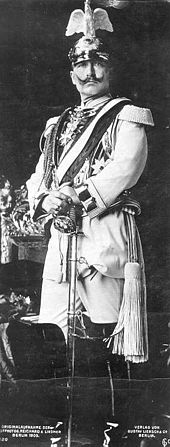 |
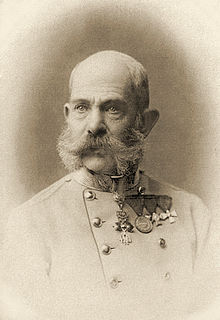 Kaiser Wilhelm II Emperor Franz Joseph world war 1 allies world war 1 allies |
In 1889, The United States was flexing its muscle in the Pacific.
Historically, avoiding foreign entanglements, they broke that rule after a near battle of fleets with Germany over commercial hegemony of the Samoan Archipelago.
The United States entered into a Tripartite agreement with Germany and Britain dividing their geographical spheres of influence.
This was their first geopolitical accord with Germany.
Thus, in 1889, America became part of the web of treaties that would be severed by war. Was it coincidence or prophesy that in that year an Austrian mother gave birth to Adolph Hitler, a future master of secret agreements made to be broken ? Ten years later in 1899, following on the heels of their Philippine acquisition from Spain in 1898, the United States annexed eastern Samoa and Germany annexed western Samoa pursuant to the Treaty of Berlin. America was firmly in the European game that created overseas empires.
World War 1 Allies World War 1 Allies
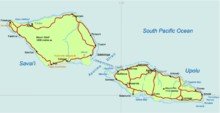 American, British, German warships anchored in Apia Harbor, Samoa, 1899. |
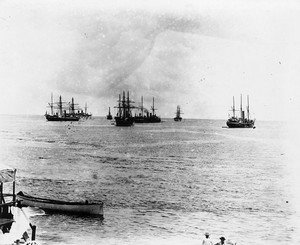 |
Italy personified the adventurism that gripped many countries in the
early 1900s. Search for the best alliance that would bring the greatest
rewards in the event of war. Italy was much more subtle than the United
States that had exacted the Philippines from Spain in 1898. Since1889, Italy was a nominal partner of Germany and Austria-Hungary. Nevertheless, Italy entered into a secret agreement with France in 1902 that effectively nullified relations with the German Triple Alliance. Italy had long coveted Trieste, immediately to its north and the Dalmatian coast to its east. Italy recognized that Austria would never voluntarily cede these areas to Italy as a price for Italian support in case of war. One year into the "war to end all wars" Italy partnered with the Triple Entente (May 3, 1915) claiming that their earlier agreement with the Triple alliance was solely meant to be of a defensive nature, and Austria had breached the agreement by commencing hostilities against Serbia. Italy did not feel uncomfortable quitting one alliance because it had become an initiator of offensive actions to join another alliance whose sole purpose was to engage in an offensive war.
World War 1 Allies click to enlarge
Every European foreign office was engaged in clandestine meetings with their counterparts from other countries. The secret understandings and treaties that traded the territories of others was the currency of diplomacy.
Countries that had in recent memory been at each others throats were now initialing secret protocols with former enemies. Russia coveted the Straits of Constantinople, the mile wide Bosphorus separating two continents, behind the guise of protecting Christians from Ottoman persecution. Britain, France, Germany and the Ottomans, the one empire most directly affected, vigorously opposed the action. Originally these same European countries had conspired to grant Russia its dream of a southern path to the sea. When the deal fell apart, what followed was the Crimean war (1853-56) setting Britain against Russia. After the Constantinople collapse of negotiations, the British forces were now deeply committed to defeating Russia, and were backed by France and the Ottoman Turks, now allies that had long held conflicting positions. However,each of these strange bedfellows had there own agendas. Catholic France was deeply committed to protecting their church's privileges in Palestine and clashed with the Russian Orthodox Church. Theological differences had morphed into national policies and the French believed that war was the only way to win that argument as well as adding territory to the empire.
The 1878 Treaty of Berlin, recognized Austria's right to administer the Ottoman provinces of Bosnia and Herzegovina and further threatened the Ottoman long time control of Macedonia. The outright annexation of these Ottoman territories in 1908 was another harbinger of a wider war. Nevertheless, the annexation was approved in 1909 by an amendment to the Treaty of Berlin. This could not have endeared Austria, (Germany's partner) to the government in Turkey whose military had once knocked at the gates of Vienna (1683)..
The rapidly dissolving Ottoman Empire left them with three options in 1914: remain neutral as favored by the Sultan, or more importantly the ruling junta controlled by a group known as the "young Turks", join the Triple Entente and ally with Russia, a menace on its border, or join with Germany and Austria that was also participating in the dismemberment of its six hundred year old empire. Their choice of the Triple Alliance sealed their ultimate destruction.
August 2, 1914: Another secret treaty committed the Ottoman Empire to enter the war the day after Germany declared war on Russia. It was so secret that the Turkish home government was unaware that one of its ministers had committed the Ottomans and left them with little wiggle room. it would take 3 more months before the Turkish government took the plunge and publicly endorsed the treaty.That ultimate alliance with Germany triggered the appetites in the war offices in London and Paris. Great Britain had designs on the Holy Land. France looked north at Syria. Both areas had long been major components of the Turkish Empire for six centuries. In the background, there were also the commercial interests that understood the international thirst for middle eastern oil.
The only way the Ottoman Empire, now 500 years old, could survive was through its ability to make and break alliances as the western countries were constantly feeding on its periphery. Russia had all but eliminated the Ottoman presence in the Balkans and Romania during the 1870s. Ten years later, Tunisia was seized by the French. Another blow to the Ottomans in North Africa, A year later, their crown jewel, Egypt, was snatched by the British on the pretext of maintaining order in areas of local unrest. Thus Great Britain controlled another piece of the Ottoman Empire while thinly disguising that they were now the masters of Egypt. The prize was the Suez Canal. This lifeline was essential for the British, whose power was on the sea, and in the event of war was an essential conduit to their colonies in the far east. .The ultimate irony would be the Turkish alliance with Germany, and its new best friend, the Austro-Hungarian Empire. The ruling Hapsburg's had annexed Bosnia-Herzegovina held by the Ottomans for centuries, but the enmity between them was shelved in favor of a greater distaste for Great Britain and led to joining forces in 1914. However, they came to the new alliance with considerable baggage. In addition to a poorly trained army, their considerable Arab population south of Turkey was not enamored with their Ottoman masters despite a common Islam religion. Their antipathy to the old regime would be used by the British led by Lt.T.E. Lawrence to exploit these divisions in the Turkish forces in Palestine and Syria.(Lawrence of Arabia--too short for army standards but pressed into the intelligence service because of his knowledge of the terrain.) Although, their French ally never looked favorably on British offensive actions in that region that did not include French forces. The latter jealously guarded their ambition to secure Syria as a war prize. Friction existed in the ranks of the Entente. Britain sought an alliance with Arab leaders that would fight the Ottomans--and consequently the Germans-- and their French allies rejected any new partner that would hinder their imperial designs in Syria.
After all of the diplomatic machinations, Britain was irretrievably now an enemy of the Ottomans and the Germans. Great Britain secretly promised Russia the Straits of Constantinople which divided two continents in exchange for a British sphere of influence in Asia minor (1915). The agreement would give control of the ancient Byzantine capital, Constantinople, (current Istanbul) to Russia. A promise that Britain did not have to honor because the secret agreement was repudiated by the new Russian Bolshevik government (1917). The Bolsheviks led by Vladimir Lenin were determined to exit the war. They probably assassinated the Czar and his family and proceeded, contrary to all prior agreements, to make a separate peace with Germany in 1917. The Triple Entente lost a partner. Russia perched on the Black Sea, lost the long sought outlet to the Mediterranean Sea.
But first things first. In 1915, the British Royal Navy and their French counterparts commenced a direct attack against Constantinople believing that success would end the war in the middle east. The plan failed because of the mine laden waters of the Dardanelles.They then attempted a land invasion targeting the Ottoman capital through the Gallipoli peninsula. Their Australian colonists fought valiantly but the Turks exacted great casualties, and after eight months the victory belonged to the home team courtesy of mistakes made by British generals. This was the greatest achievement of the Ottomans in the entire war and featured the Turkish hero, Mustafa Kemal Ataturk, the future founder of the Turkish republic.
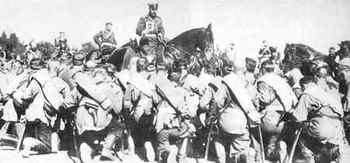 Czar and Troops |
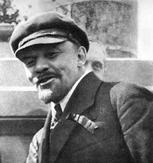 Vladimir. Lenin World War 1 Allies |
World War 1 Allies
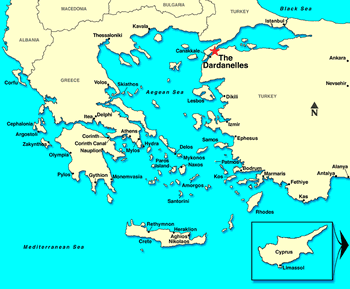
.In Asia, Japan tardily entered the modern world. Its military
build up and industrialization was originally encouraged by Theodore Roosevelt. He
saw Japan as a kindred spirit that could bring western civilization to
Asia. Belatedly, Roosevelt would later have second thoughts.
From 1894 to 1895, Japanese forces sought to extend its reach onto the Korean peninsula. They successfully defeated the Chinese army and China was forced to cede the Liadong Peninsula to Japan. This strategic territory would bring the Russians in conflict with Japanese empire building. Succumbing to the pressure of Germany, France and Russia the Japanese withdrew from the Peninsula.
Russia was desperate for
a warm water port on the Pacific Ocean. Their far northern port of
Vladivostok was closed by ice in the long winter months. Port Arthur, on
the aforementioned Liadong was ideal. In a typical display of gunboat
diplomacy, their fleet sailed into Port Arthur and in 1898 exacted a
favorable lease from a weak China. The map displays the favorable geo-political position of Russia over lands lying between Port Arthur and Russian Siberia. This did not escape the notice of the Japanese.
World War 1 Allies
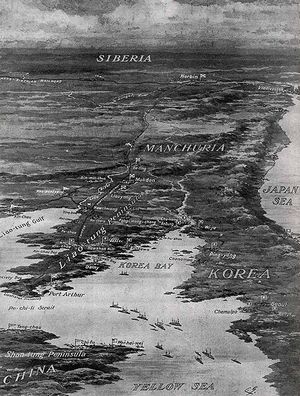
World War 1 Allies
Boxer Rebellion
In the first year of the 20th Century, the international community was exploiting the wealth of China. They maintained huge legations in Shanghai and the capital, Beijing. Their presence prompted a Chinese populace revolt that endangered the diplomats and all foreigners. A large international force of eight nations was assembled to protect their interests. Japan and Russia were well represented. The latter landed over 170,000 men. After the security forces were no longer necessary, they began their withdrawal----except Russia who promised to leave, but did not.
World War 1 Allies
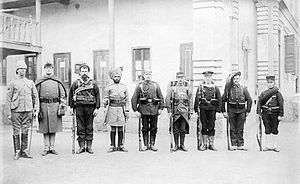
Multi-Nationals
Britain, United States, Australian, British India, Germany, France, Austria-Hungary, Italy, Japan
absentee: Russia
World War 1 Allies
Great Britain was always suspicious of Russia's expansionist designs as well as the presence of the French navy--and then there was the French-Russian alliance of 1894 to ponder.
They held competing interests in the Middle East, and in 1902 they were encroaching on British interests further east in China.
It was time for an understanding with Japan that would isolate Russia from European aid and counter the French presence with the British and Japanese fleets.
The Agreement provided for neutrality if either country were involved in war; support, if the war was against more than one power; and no other pacts that would affect the validity of the treaty.
One immediate benefit was the exchange of intelligence regarding Russian strength.
In 1904, the Japanese and Russians attempted to resolve their differences without success. The Japanese, with the British treaty at their back, attacked the Russian fleet in Port Arthur. They followed with a land war and the ultimate defeat of Russia. Japan had made its mark as a world power, and the Russian defeat was a welcome sign for Germany. Russia lost its warm water port and its influence in Korea and Manchuria. The progenitor of the peace was President Teddy Roosevelt who won a Nobel Peace prize (initiated in 1901) for the effort.
Japan entered World War 1 in its first year (1914) ostensibly as Britain's ally, but effectively an ally of Russia and France. Japanese strikes at Germany's Pacific possessions (prizes which Japan retained) drained German resources and manpower. It was not until 1916 that Japan and Russia had an official rapprochement. Their treaty provided that neither would make a separate peace treaty with Germany or any of its Central Powers allies.
Japan's entry in 1914 justified the title of World War and heavily weighted the power of the Triple Entente.
World War 1 Allies
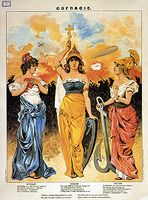
The Russian view of the Triple Entente
The circuitous roads that led to this war included the relationship between Austria-Hungary, a large power, and the comparatively small and marginal state of Serbia. The larger power directed its attention and territorial ambitions to the Adriatic coast south of Austria.It already had a power base in Bosnia. Serbia was a stumbling block, and of necessity, so was its strong ally, Russia.
Austria had the assurance of Kaiser Wilhelm that Germany would back the expansion even at the risk of a larger war that would almost certainly create a conflict with Russian ambitions in the Balkan countries. The Russian defeat at the hands of Japan was not missed by the Germans who now understood the basic weakness of Russia.
The back story involved another secret agreement. In 1912, Bulgaria, Greece and Serbia broke away from the Ottoman Empire (First Balkan War). Macedonia was then parceled out between the victors. Bulgaria was unhappy with its share, and did not know at the time that a secret agreement between Greece and Serbia had conspired to reduce Bulgarian share of the spoils. In 1913, Bulgaria attacked Greece and Serbia and was soundly defeated. Austria-Hungary had backed Bulgaria and Russia stood behind its Serbian ally (Second Balkan War). Austria was not deterred. It looked for ways to goad Serbia into striking the first blow.
Serbian assassins lit the fuse on June 28, 1914.They shot and killed the touring heir apparent ( Arch Duke Ferdinand and his wife Sophia) to the Austrian throne in Sarajevo, Bosnia. Serbia could not placate Austria already intent on war. The serbian trial that followed found 16 conspirators guilty and three were hung.
World War 1 Allies World War 1 Allies
 |
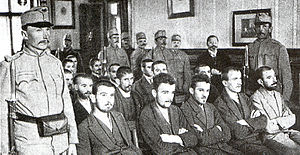 Ferdinand vehicle Trial of conspirators |
On July 28,1914, Austria declared war on Serbia. The dominoes began to fall and all of the prior secret and public accords began to play out. July 30, Russia (Serbia ally) declared war on Austria-Hungary. On August 1, Germany (ally of Austria Hungary) declared war on Russia. August 3, Germany declares against France (Russian ally). August 4, Germany requires free passage through neutral Belgium (which was refused) to attack France and declares war against Belgium. United Kingdom responding on the same day to a breach of the 1839 Treaty guarantying Belgian neutrality declares war on Germany. August 6, Serbia (Russian ally) declares against Germany (Austria-Hungary ally). On the same day, (August 6), Austria-Hungary declared war against Russia. August 11, France (Russian ally) responds and declares war on Austria-Hungary (ally of Germany). August 12, United Kingdom declares war on Austria- Hungary (ally of Germany).
At this point, the Central Powers had solidified their alliance minus Italy which had declared its neutrality, and completely jumped ship the following year in favor of the Triple Entente. Italy was opportunistic, but also concerned with the German's covetous intentions.
|
A cartoon in an Italian publication in 1915 mocking Germans. |
 |
We noted the tight Russo- French relationship. Through August 12, 1914, the United Kingdom had not entered into any mutual military alliance with any European nation. Until the German invasion of Belgium, Britain had maintained its "splendid isolation" from all of its European neighbors. Its two treaties, France in 1904 and Russia in 1907 were commercial in nature. Factually, Britain had been a traditional friend of Germany and more at odds with France and Russia over commercial interests in Africa, Middle East, and Asia.
The unlikely glue that formed the Triple Entente was the Belgium Treaty of 1839 and the threat of a huge German navy that threatened British overseas commercial interests.
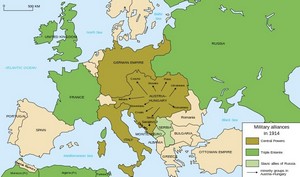 |
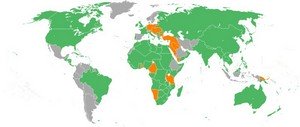 Triple Entente and partners Triple Alliance pre 1914 |
From 1914-1917, the United States remained on the sidelines.
There had always been the public sentiment generated since its Revolutionary times to avoid foreign entanglements.
It was averse to military pacts and secret agreements.
President Woodrow Wilson (1913-1921) on the secret world of treaties:
“Open covenants of peace openly arrived at, after which there shall be no private international understandings of any kind, but diplomacy shall proceed always frankly and in the public view.”
Nevertheless there was a growing sentiment favoring Great Britain and France. Both countries were significant trading partners. The German policy (February 1, 1917) placed all neutral shipping at risk. American ships were fair game to German submarines.
On February 3, the American freighter, Housatanic was sunk. On April 1, the Aztec was sunk with 28 Americans lost.
Between those two hostile events, the German Ambassador to Mexico, Zimmerman, in a coded telegram (March 1), promised Mexico financial support and return of lost territories if they would declare war against the United States. British intelligence had decoded the message and passed it to the Americans. The note was published in the United States and public opinion immediately pressed the administration for a war against Germany. President Wilson was about to make a 180 degree turn. While the war raged on three continents, Wilson intentionally had maintained a small army of just over 100,000 men. This was his way of dampening the calls for intervention. Circumstances now called for a new principle. Wilson had preached, during his first term, a principle that kept Americans safe from a foreign war. The new policy required American intervention to keep the world "safe for democracy".
President Wilson sent a war request to Congress (April 2, 1917) which was overwhelmingly adopted. In the message, Wilson said:
"With a profound sense of the solemn and even tragical character of the step I am taking and of the grave responsibilities which it involves, but in unhesitating obedience to what I deem my constitutional duty, I advise that the Congress declare the recent course of the Imperial German Government to be in fact nothing less than war against the Government and people of the United States; that it formally accept the status of belligerent which has thus been thrust upon it, and that it take immediate steps not only to put the country in a more thorough state of defense but also to exert all its power and employ all its resources to bring the Government of the German Empire to terms and end the war".
America's entry into the war was met with similar declarations from Central and South American nations. Mexico was silent. Many of the associated countries were former enemies, but mutual interests with the United States and the Entente nations trumped: e.g. China and Japan.They were referred to as the "Allies" and their combined power would subdue the German alliance. The "Central Powers" were now outgunned in Asia.
American soldiers boarded the first ships to Europe in the spring of 1917 to join the British and French with whom they had no prior military alliance, but merely a friendly sympathy with their plight against a common enemy. Germany, had overplayed its hand and forced an American reaction to act in concert with the original Triple Entente. In a strange act of nonconformity with with its Entente allies, the United states never declared war against the Ottoman Empire. Their presence in the Middle East would have been welcomed by the French and British who might have agreed to give America greater influence in the region after the war, and in this manner resolve their own conflicts with each other by completely withdrawing in the favor of a third party. An American that was devoted to peoples "self determination", President Wilson seems to have ignored the possibilities inherent in that paramount position that would have given the United States complete control of the Ottoman's southern empire (Syria, Palestine, Arabia), and an Arab population that admired the Americans, hated the French and mistrusted the British. "What if ?" We will never know.
World War 1 Allies World War 1 Allies
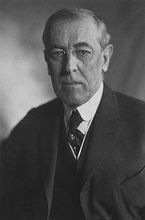 |
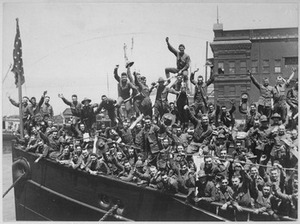 |
Triple Alliance
Courtesy of Wikipedia
Austria-Hungary, German Empire, Ottoman Empire, Bulgaria, Jabal Shammar(Saudi Arabia), Sultanate of
Darfur, Azerbaijan
Casualties 13 million
Men under arms 20 million
World War 1 Allies
Triple Entente and Associated Powers
Great Britain, Third French Republic, Russia(until 1917)
Belgium, Bolivia, Brazil, the British Empire, China, Cuba, Czechoslovakia,
Ecuador, France, Greece, Guatemala, Haiti, the Hejaz, Honduras, Italy, Japan,
Liberia, Nicaragua, Panama, Peru, Poland, Portugal, Romania, Serb-Croat-Slovene
State, Siam,
the United States, and Uruguay
Casualties 18 million
Men Under Arms 40 million
______________________________________________________________________
References and Sources:
Anderson, Scott, Lawrence In Arabia, Doubleday, New York 2013.
Cocks, F. Seymour. The Secret Treaties and Understandings. London: Union of Democratic Control.
Encyclopedia Britannica
Wikipedia
Woodward, David R. World War I Almanac, Facts on File. New York 2009.
History of American Wars | Causes of World War 1 | World War 1 Allies
.
